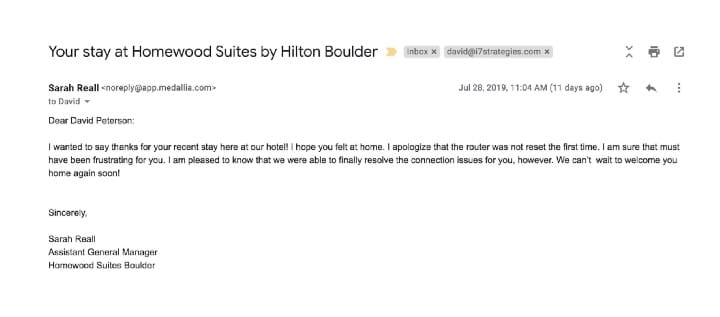
Every July, I get the honor to teach at the Graduate School of Banking held at the University of Colorado in Boulder. If you are in financial services and want to position yourself as a future CSuite executive, this is the school you should attend. Check it out here. During my technology class in a discussion about an FI’s social media and online presence, I made the statement that when I am researching a company, it does not bother me to see a negative review. In fact, if I don’t see some less than stellar reviews, I consider that maybe the information is bogus. There will always be somebody that gets sideways for some reason. It happens. What I want to see is that the company respond to the comment.
It shocks me to see how many companies don’t pay attention online. Somebody goes and posts on Twitter or maybe even through “Contact Us,” and the company does not respond. Say I was researching an AirBnB location, and I see that a previous guest had an issue with trash removal, but there is a response from the owner that says, 1) Thanks for your comment; 2) I am so sorry you had a problem; 3) Here is the reason that happened; and 4) I have corrected this so it won’t happen again. It’s not hard to do, but first you must be aware that there is a comment that requires your remediation. There are numerous tools that will sniff the web and provide a notice if your company name or other keywords are used. Very few companies deploy these tools. Not paying attention to “Contact Us” though, is especially egregious. That is something you completely control, but time and again, I find examples where companies are not paying attention.
Who gets notified when someone accesses your website and enters a “Contact us”? Do you know? Go and create a “Contact Us” and see if anyone responds. Don’t be surprised if no one is “watching the store.” I generally find that “Contact Us” is routed to a specific person at a company, such as joe@mycompany.com. Well, what happens if Joe is on vacation? What if Joe quit two years ago and no one changed the “Contact Us” to flow to a different employee? Don’t laugh; this happens all the time.
During the GSBC session in Colorado, the faculty stays at the Homewood Suites in Boulder. They are so attentive to the needs of our group and are most accommodating. The suites make it nice for an extended stay, two weeks in my case. And since I teach in the afternoons, I can get up early and work all morning before heading over to campus. On two separate occasions, there were problems with the hotel Wi-Fi that caused specific issues for the work and presentations I had planned for those times. Very inconvenient. So after checking out, I got an email asking me to do a survey of my stay. I generally rated them high, but did note the inconvenience of the problems with internet connection. My submission was on July 27th. On July 28th, I received the following email from Sarah Reall, Assistant General Manager of the Homewood Suites:

Look at the format of this email: 1) Thanks; 2) Apology for your inconvenience; 3) We fixed the problem; 4) We can’t wait to have you back. This is exactly what my experience has been with this hotel, but sadly, this experience is rare. Why? How hard is it for you to simply respond to anyone who has an issue with your product or services? Hilton is obviously paying attention to communication directed to them. Sarah is a great manager who took the time to follow up. I am sure this is part of the training that Hilton provides for all its management.
Set up a procedure for your company to ensure you always provide a response to someone who communicates with you, either directly or indirectly, through any medium. If the matter requires you to communicate privately, then publicly you should say, 1) Thanks for your business; 2) Sorry you had a problem; and 3) I am contacting you offline to resolve your issue. That is enough for me to see that one, you are paying attention, and two, are interested in remediating problems. This is not that hard to do, but you must make a commitment to make innovation in the customer experience a priority for you and your company.